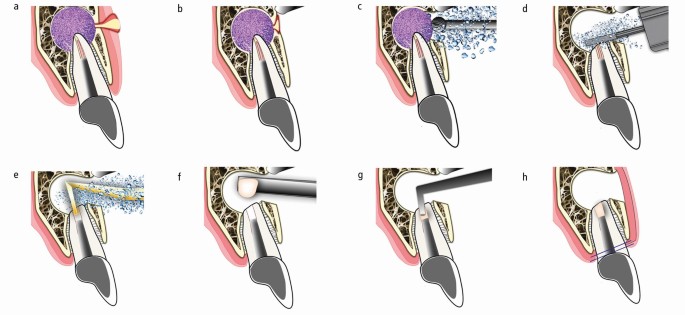
Apicoectomy

What is an apicoectomy?
Apicalectomy is a minor surgical procedure that involves removing the tip of the root of a tooth (apical root), the surrounding pathological tissues (such as a cyst), and sealing the remaining portion of the root. The portion of the tooth visible in the mouth remains intact, while within a few months the cyst area fills with new bone.
The purpose of an apicalectomy is to combat infection around the tip of the root, so as to save the tooth and avoid its extraction. In this way, the increased cost of alternative treatments, such as extraction with subsequent placement of a bridge or implant, can be avoided.
The procedure is performed in the doctor’s office under local anesthesia, which ensures the absence of pain during and after the wound heals. In some cases, swelling may be observed during the healing of the incision, which is completely normal.

What is an apicoectomy?
Apicalectomy is a minor surgical procedure that involves removing the tip of the root of a tooth (apical root), the surrounding pathological tissues (such as a cyst), and sealing the remaining portion of the root. The portion of the tooth visible in the mouth remains intact, while within a few months the cyst area fills with new bone.
The purpose of an apicalectomy is to combat infection around the tip of the root, so as to save the tooth and avoid its extraction. In this way, the increased cost of alternative treatments, such as extraction with subsequent placement of a bridge or implant, can be avoided.
The procedure is performed in the doctor’s office under local anesthesia, which ensures the absence of pain during and after the wound heals. In some cases, swelling may be observed during the healing of the incision, which is completely normal.

What is an apicoectomy?
Apicoectomy is a minor surgical procedure that involves the removal of the tip of a tooth’s root (apex), the surrounding pathological tissues (such as cysts), and the filling of the remaining part of the root. The part of the tooth that is visible in the mouth remains intact, while, after a few months, the cyst area is filled with new bone.
The goal of an apicoectomy is to combat the infection around the root tip, so the tooth can be saved and its extraction avoided. In this way, the increased cost of alternative treatments, such as extraction followed by the placement of a bridge or implant, can be avoided.
The procedure is performed in the dental office under local anesthesia, ensuring no pain during and after the healing of the wound. In some cases, swelling may occur during the healing of the incision, which is completely normal after any surgical procedure.



When is an apicoectomy necessary?
Apicoectomy is usually necessary when denervation has not repaired the damage or in cases of failure of endodontic treatment. It is also necessary when there is a cyst or abscess in the root area of the tooth that cannot be treated with endodontic treatment or when the treatment attempt has failed. In addition, the procedure is indicated when a small instrument has broken during endodontic treatment or when the anatomy of the root canal makes it impossible to clean it effectively.

When is an apicoectomy necessary?
Apicoectomy is usually necessary when denervation has not repaired the damage or in cases of failure of endodontic treatment. It is also necessary when there is a cyst or abscess in the root area of the tooth that cannot be treated with endodontic treatment or when the treatment attempt has failed. In addition, the procedure is indicated when a small instrument has broken during endodontic treatment or when the anatomy of the root canal makes it impossible to clean it effectively.

When is an apicoectomy necessary?
Apicoectomy is usually necessary when denervation has not repaired the damage or in cases of failure of endodontic treatment. It is also necessary when there is a cyst or abscess in the root area of the tooth that cannot be treated with endodontic treatment or when the treatment attempt has failed. In addition, the procedure is indicated when a small instrument has broken during endodontic treatment or when the anatomy of the root canal makes it impossible to clean it effectively.

Success rate of apicoectomy
The success of apicoectomy depends on the skill of the surgeon. As with any surgical procedure, there is always a risk of complications or failure. Patient follow-up and x-rays after 6-8 months will determine the success of the procedure.

Success rate of apicoectomy
The success of apicoectomy depends on the skill of the surgeon. As with any surgical procedure, there is always a risk of complications or failure. Patient follow-up and x-rays after 6-8 months will determine the success of the procedure.

Success rate of apicoectomy
The success of apicoectomy depends on the skill of the surgeon. As with any surgical procedure, there is always a risk of complications or failure. Patient follow-up and x-rays after 6-8 months will determine the success of the procedure.

Is tooth extraction preferable to apicoectomy?
When a tooth is removed, it must be replaced to restore full function and prevent problems with healthy teeth. Replacement usually involves an implant, bridge, or partial denture. However, none of these options can provide a better result than a natural tooth. With a root canal, you choose to keep your natural tooth, which can remain healthy for a lifetime.

Is tooth extraction preferable to apicoectomy?
When a tooth is removed, it must be replaced to restore full function and prevent problems with healthy teeth. Replacement usually involves an implant, bridge, or partial denture. However, none of these options can provide a better result than a natural tooth. With a root canal, you choose to keep your natural tooth, which can remain healthy for a lifetime.

Is tooth extraction preferable to apicoectomy?
When a tooth is removed, it must be replaced to restore full function and prevent problems with healthy teeth. Replacement usually involves an implant, bridge, or partial denture. However, none of these options can provide a better result than a natural tooth. With a root canal, you choose to keep your natural tooth, which can remain healthy for a lifetime.



